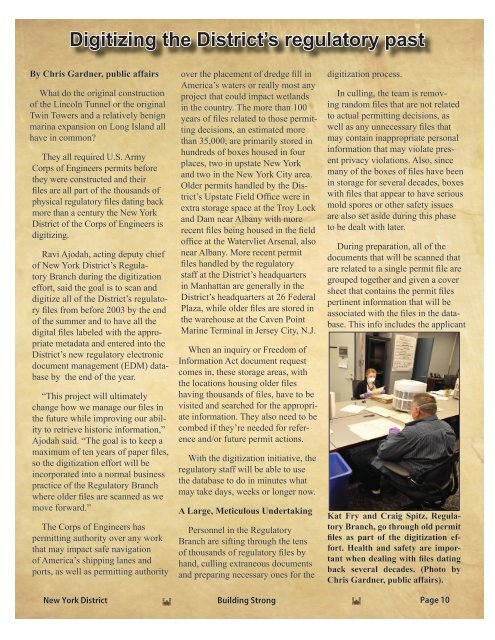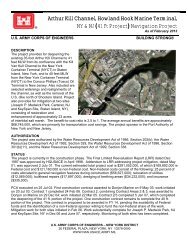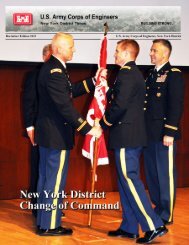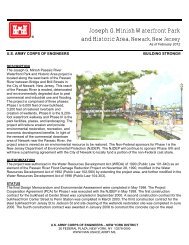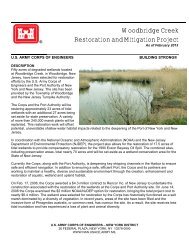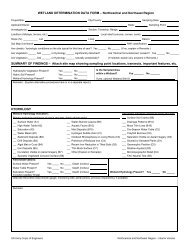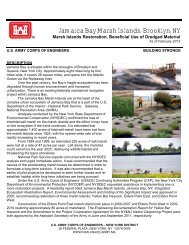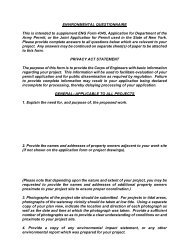New York District team responds to Missouri tornado
New York District team responds to Missouri tornado
New York District team responds to Missouri tornado
Create successful ePaper yourself
Turn your PDF publications into a flip-book with our unique Google optimized e-Paper software.
Digitizing the <strong>District</strong>’s regula<strong>to</strong>ry past<br />
By Chris Gardner, public affairs<br />
What do the original construction<br />
of the Lincoln Tunnel or the original<br />
Twin Towers and a relatively benign<br />
marina expansion on Long Island all<br />
have in common<br />
They all required U.S. Army<br />
Corps of Engineers permits before<br />
they were constructed and their<br />
files are all part of the thousands of<br />
physical regula<strong>to</strong>ry files dating back<br />
more than a century the <strong>New</strong> <strong>York</strong><br />
<strong>District</strong> of the Corps of Engineers is<br />
digitizing.<br />
Ravi Ajodah, acting deputy chief<br />
of <strong>New</strong> <strong>York</strong> <strong>District</strong>’s Regula<strong>to</strong>ry<br />
Branch during the digitization<br />
effort, said the goal is <strong>to</strong> scan and<br />
digitize all of the <strong>District</strong>’s regula<strong>to</strong>ry<br />
files from before 2003 by the end<br />
of the summer and <strong>to</strong> have all the<br />
digital files labeled with the appropriate<br />
metadata and entered in<strong>to</strong> the<br />
<strong>District</strong>’s new regula<strong>to</strong>ry electronic<br />
document management (EDM) database<br />
by the end of the year.<br />
“This project will ultimately<br />
change how we manage our files in<br />
the future while improving our ability<br />
<strong>to</strong> retrieve his<strong>to</strong>ric information,”<br />
Ajodah said. “The goal is <strong>to</strong> keep a<br />
maximum of ten years of paper files,<br />
so the digitization effort will be<br />
incorporated in<strong>to</strong> a normal business<br />
practice of the Regula<strong>to</strong>ry Branch<br />
where older files are scanned as we<br />
move forward.”<br />
The Corps of Engineers has<br />
permitting authority over any work<br />
that may impact safe navigation<br />
of America’s shipping lanes and<br />
ports, as well as permitting authority<br />
over the placement of dredge fill in<br />
America’s waters or really most any<br />
project that could impact wetlands<br />
in the country. The more than 100<br />
years of files related <strong>to</strong> those permitting<br />
decisions, an estimated more<br />
than 35,000, are primarily s<strong>to</strong>red in<br />
hundreds of boxes housed in four<br />
places, two in upstate <strong>New</strong> <strong>York</strong><br />
and two in the <strong>New</strong> <strong>York</strong> City area.<br />
Older permits handled by the <strong>District</strong>’s<br />
Upstate Field Office were in<br />
extra s<strong>to</strong>rage space at the Troy Lock<br />
and Dam near Albany with more<br />
recent files being housed in the field<br />
office at the Watervliet Arsenal, also<br />
near Albany. More recent permit<br />
files handled by the regula<strong>to</strong>ry<br />
staff at the <strong>District</strong>’s headquarters<br />
in Manhattan are generally in the<br />
<strong>District</strong>’s headquarters at 26 Federal<br />
Plaza, while older files are s<strong>to</strong>red in<br />
the warehouse at the Caven Point<br />
Marine Terminal in Jersey City, N.J.<br />
When an inquiry or Freedom of<br />
Information Act document request<br />
comes in, these s<strong>to</strong>rage areas, with<br />
the locations housing older files<br />
having thousands of files, have <strong>to</strong> be<br />
visited and searched for the appropriate<br />
information. They also need <strong>to</strong> be<br />
combed if they’re needed for reference<br />
and/or future permit actions.<br />
With the digitization initiative, the<br />
regula<strong>to</strong>ry staff will be able <strong>to</strong> use<br />
the database <strong>to</strong> do in minutes what<br />
may take days, weeks or longer now.<br />
A Large, Meticulous Undertaking<br />
Personnel in the Regula<strong>to</strong>ry<br />
Branch are sifting through the tens<br />
of thousands of regula<strong>to</strong>ry files by<br />
hand, culling extraneous documents<br />
and preparing necessary ones for the<br />
digitization process.<br />
In culling, the <strong>team</strong> is removing<br />
random files that are not related<br />
<strong>to</strong> actual permitting decisions, as<br />
well as any unnecessary files that<br />
may contain inappropriate personal<br />
information that may violate present<br />
privacy violations. Also, since<br />
many of the boxes of files have been<br />
in s<strong>to</strong>rage for several decades, boxes<br />
with files that appear <strong>to</strong> have serious<br />
mold spores or other safety issues<br />
are also set aside during this phase<br />
<strong>to</strong> be dealt with later.<br />
During preparation, all of the<br />
documents that will be scanned that<br />
are related <strong>to</strong> a single permit file are<br />
grouped <strong>to</strong>gether and given a cover<br />
sheet that contains the permit files<br />
pertinent information that will be<br />
associated with the files in the database.<br />
This info includes the applicant<br />
Kat Fry and Craig Spitz, Regula<strong>to</strong>ry<br />
Branch, go through old permit<br />
files as part of the digitization effort.<br />
Health and safety are important<br />
when dealing with files dating<br />
back several decades. (Pho<strong>to</strong> by<br />
Chris Gardner, public affairs).<br />
<strong>New</strong> <strong>York</strong> <strong>District</strong> Building Strong<br />
Page 10


